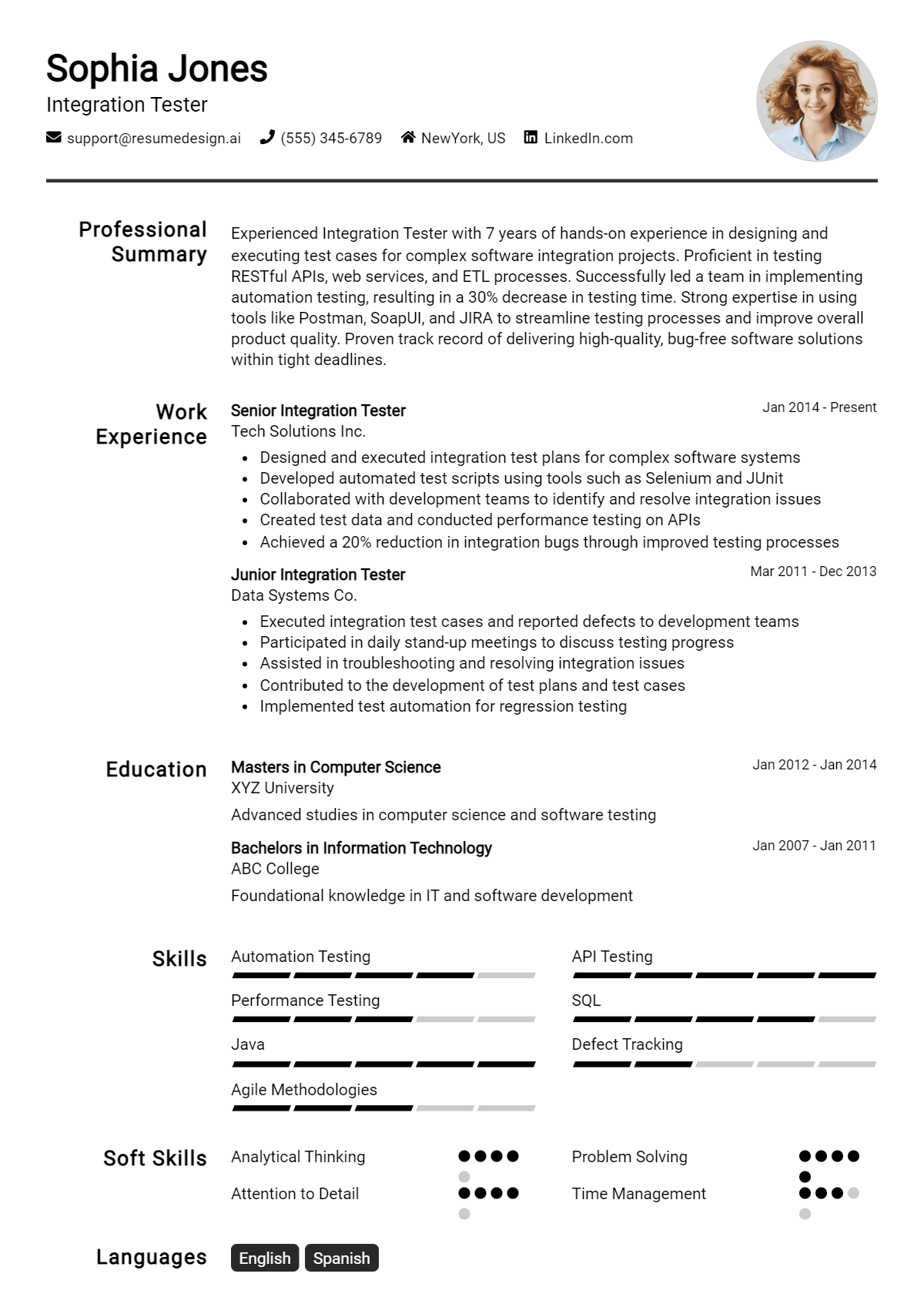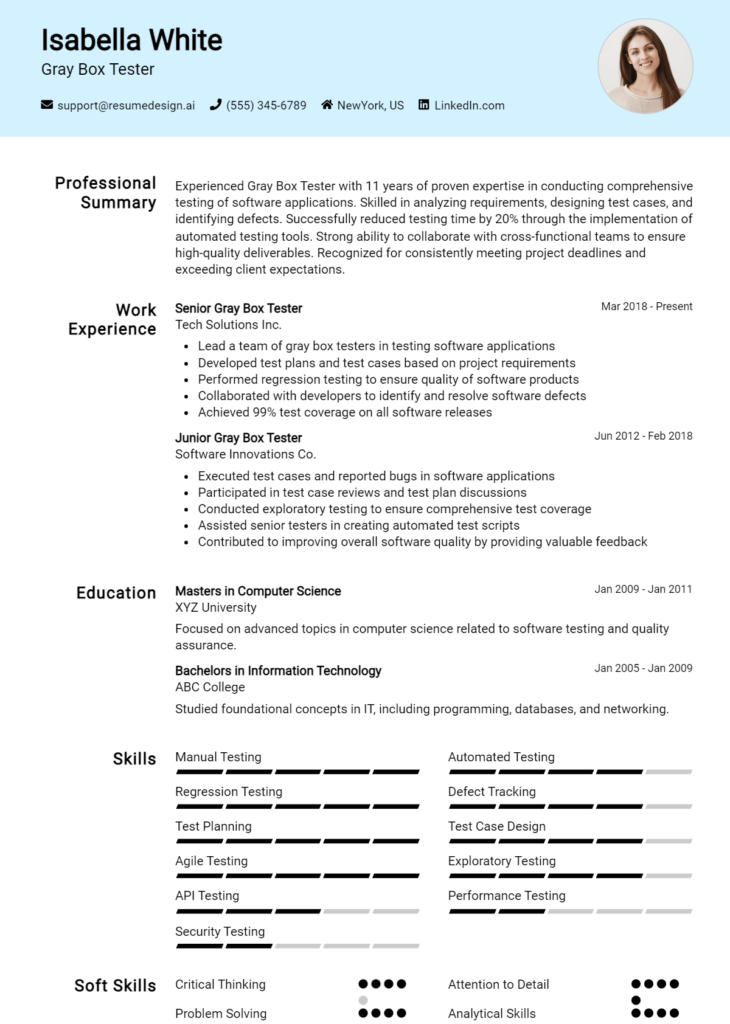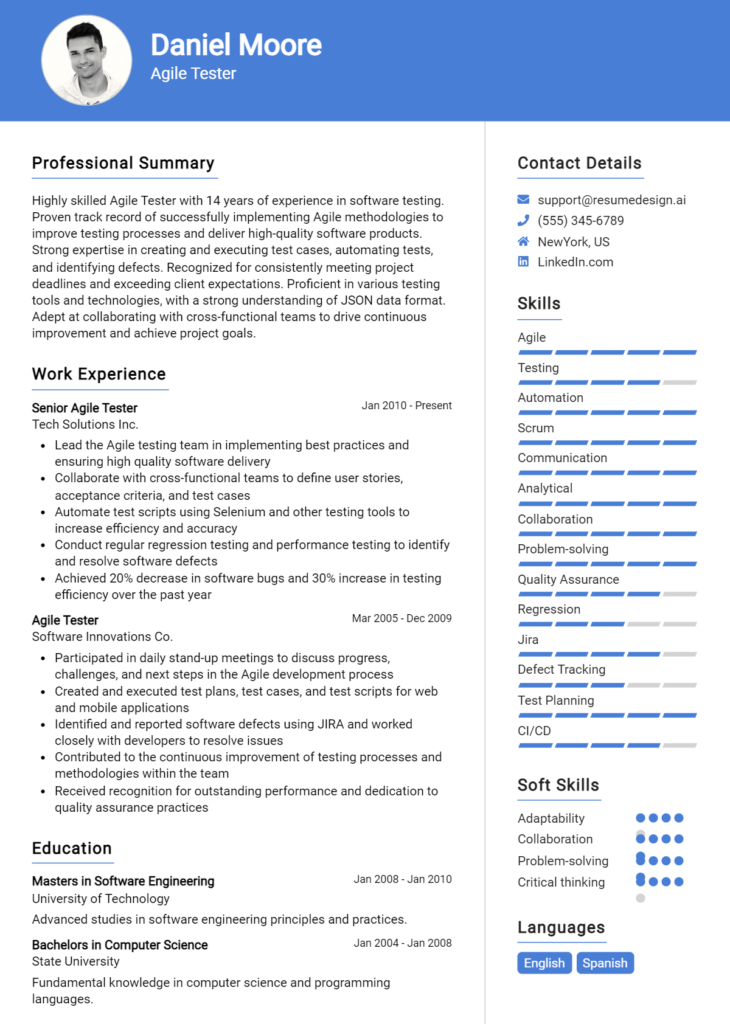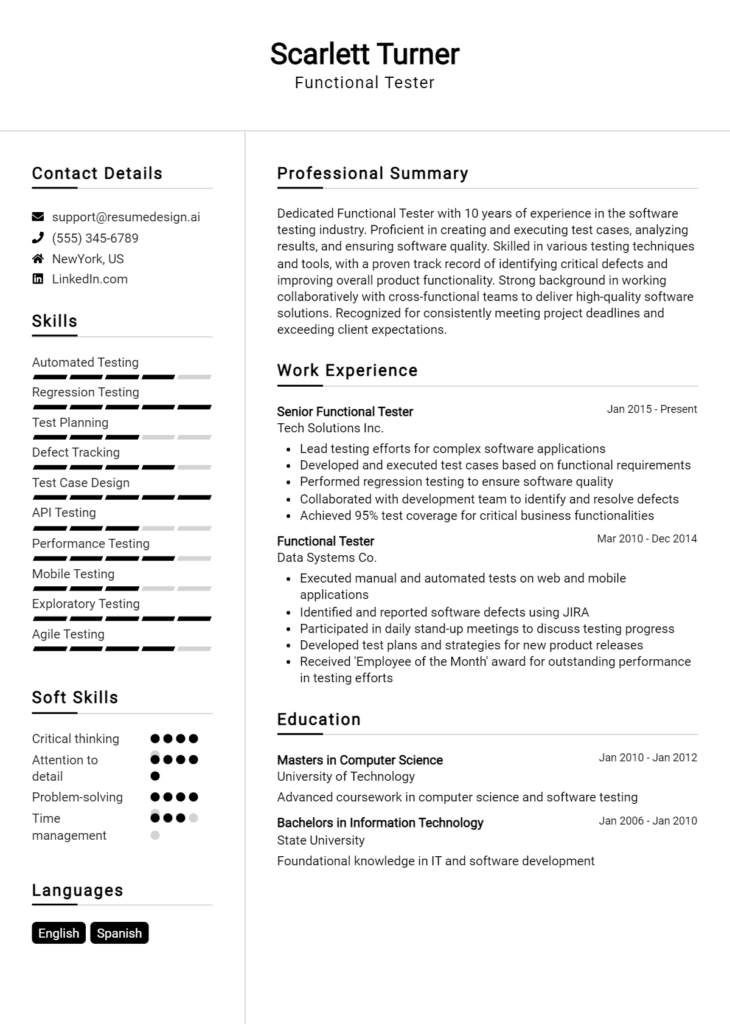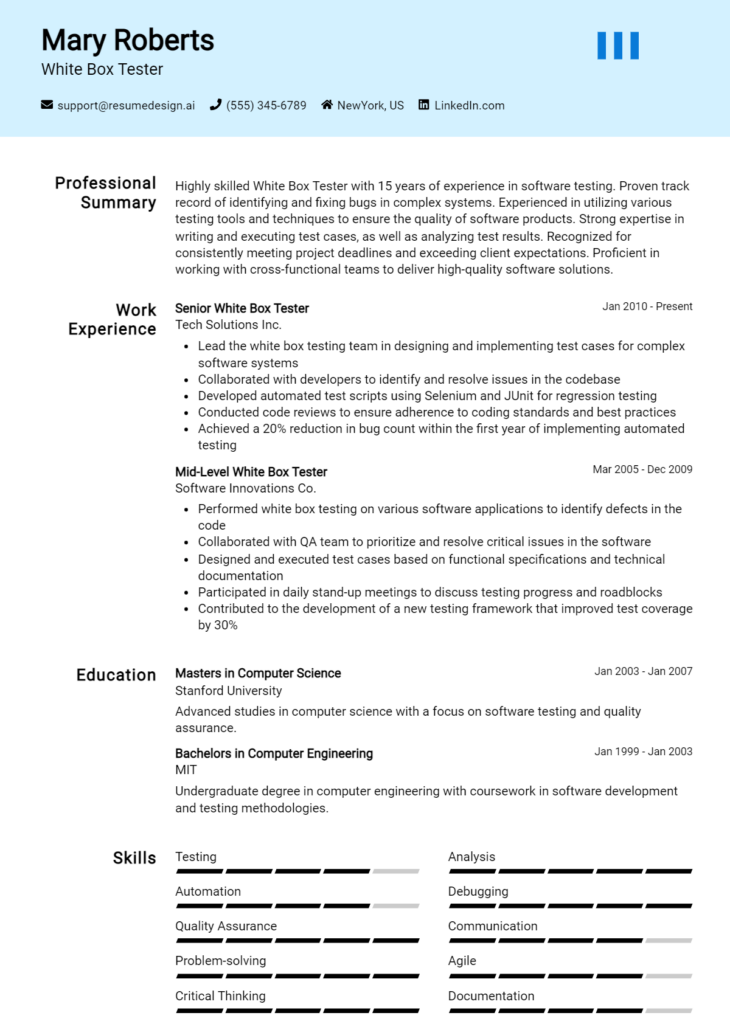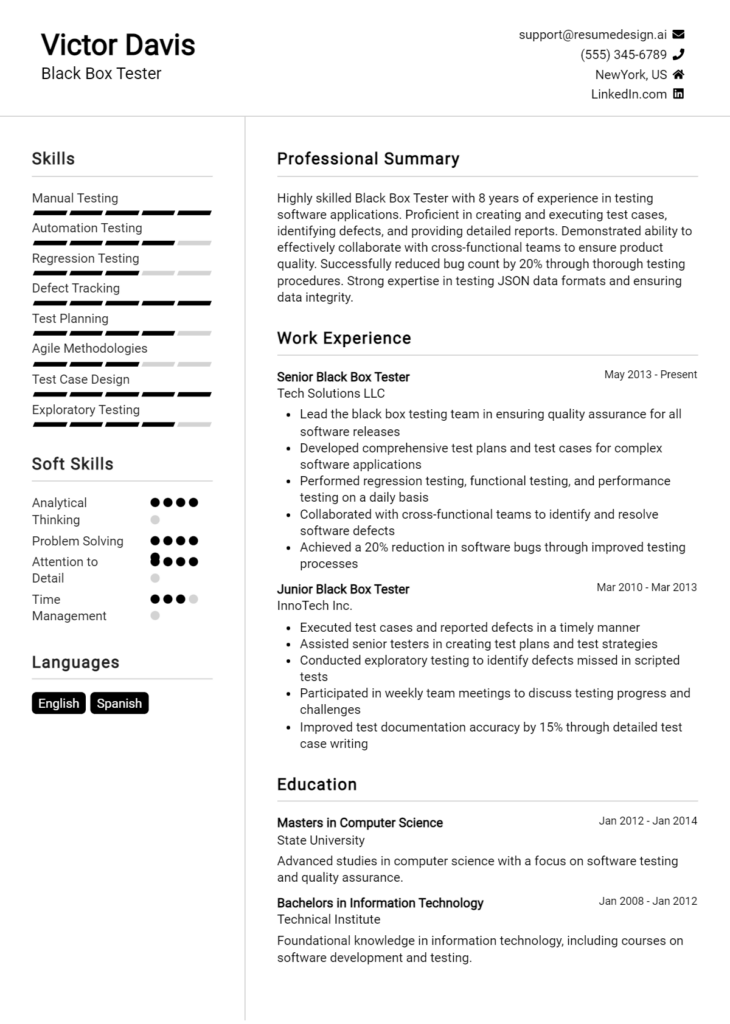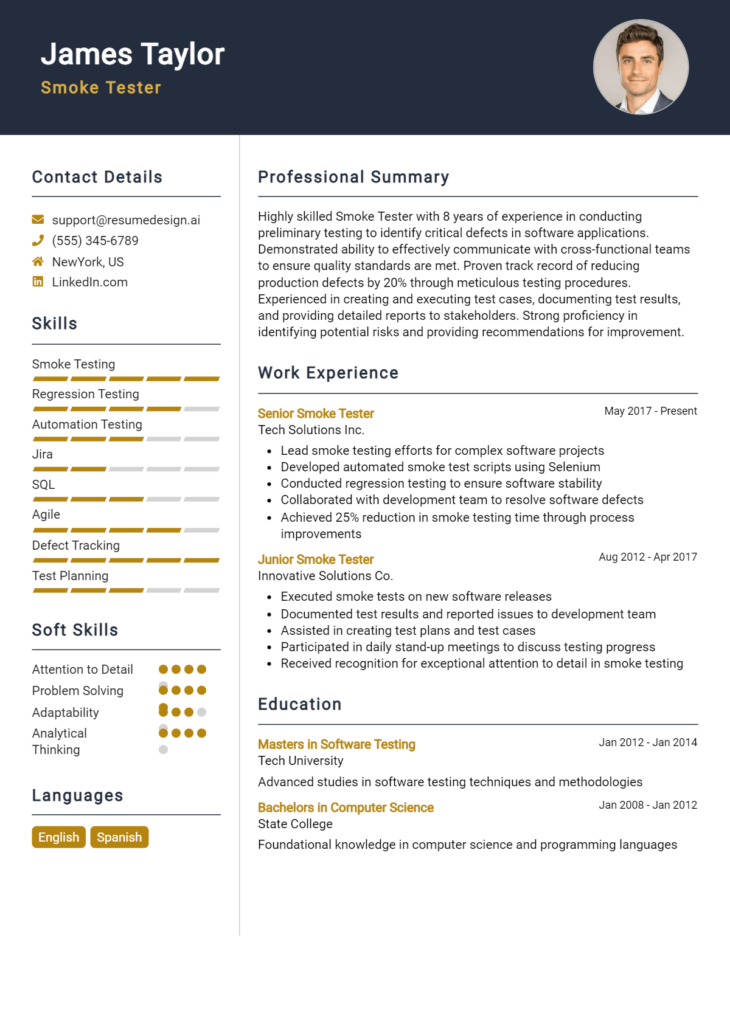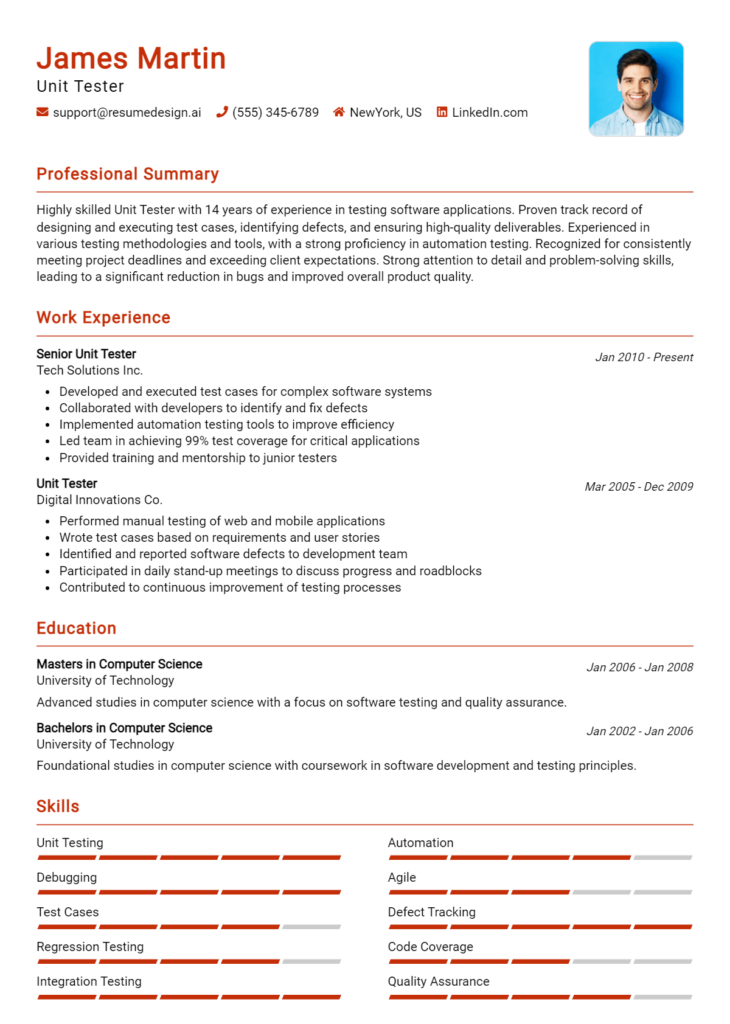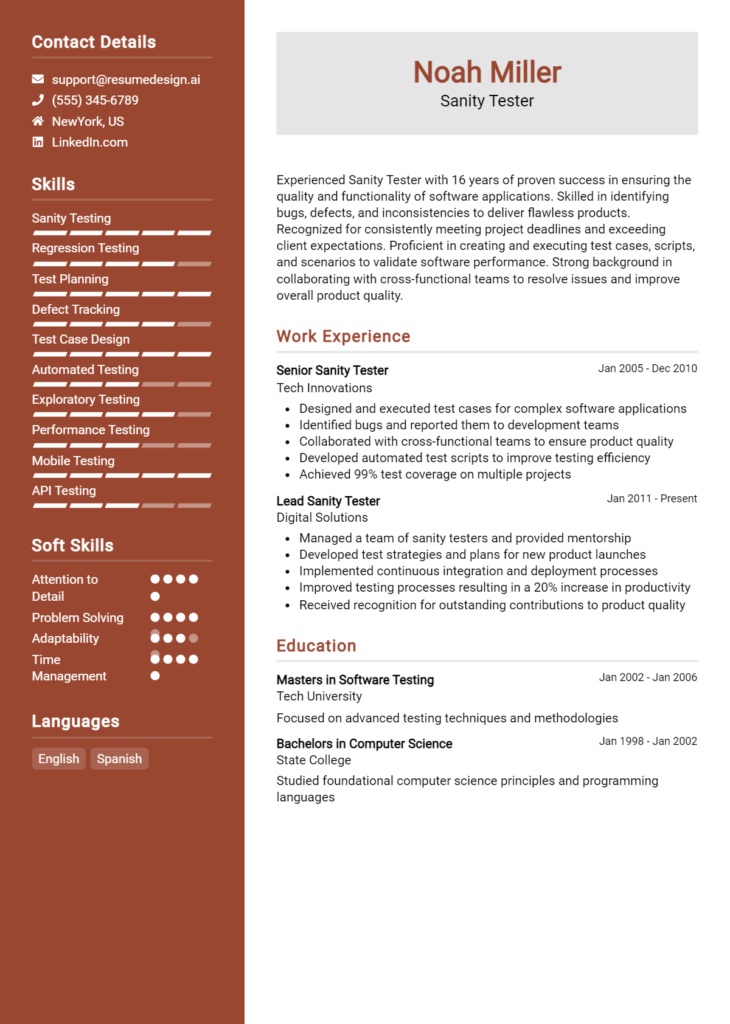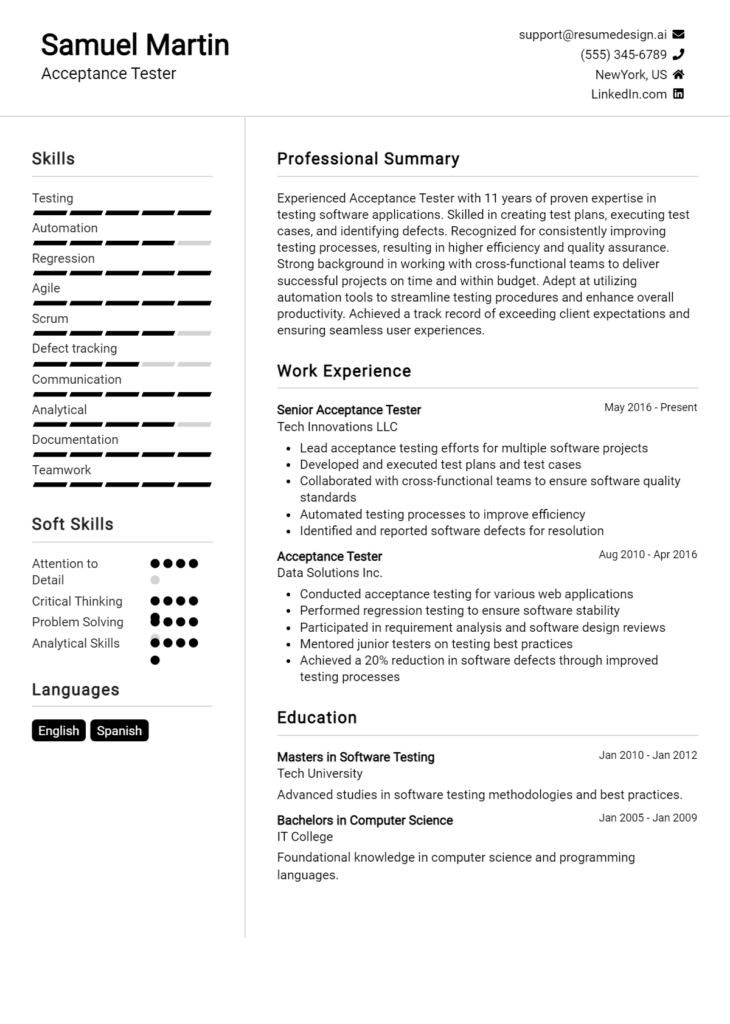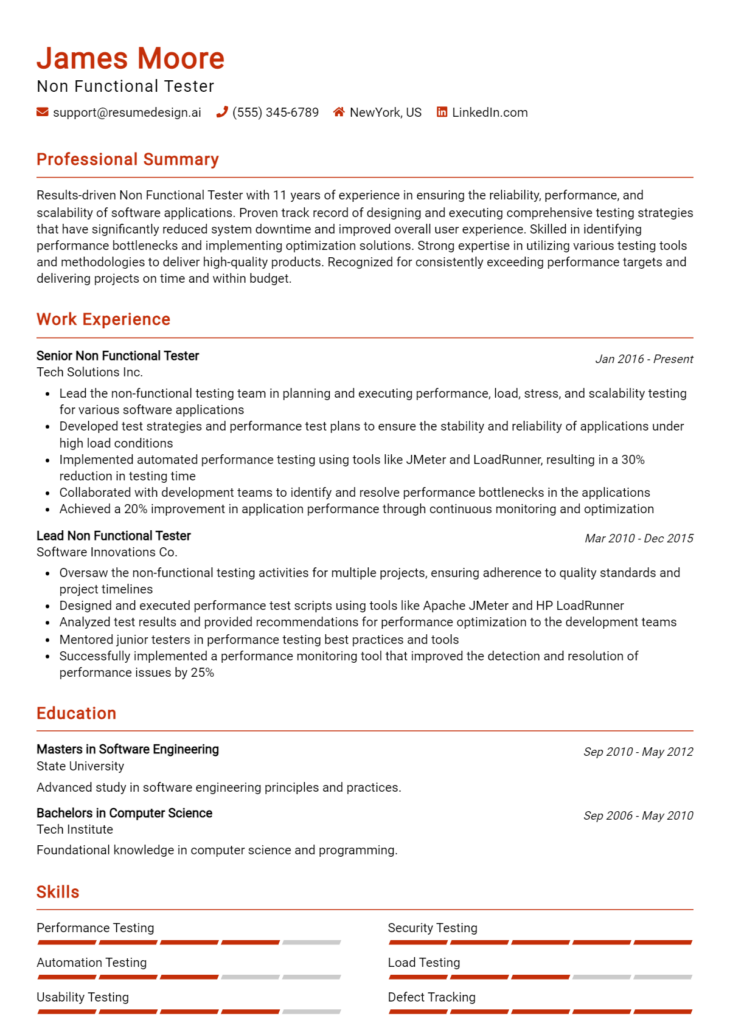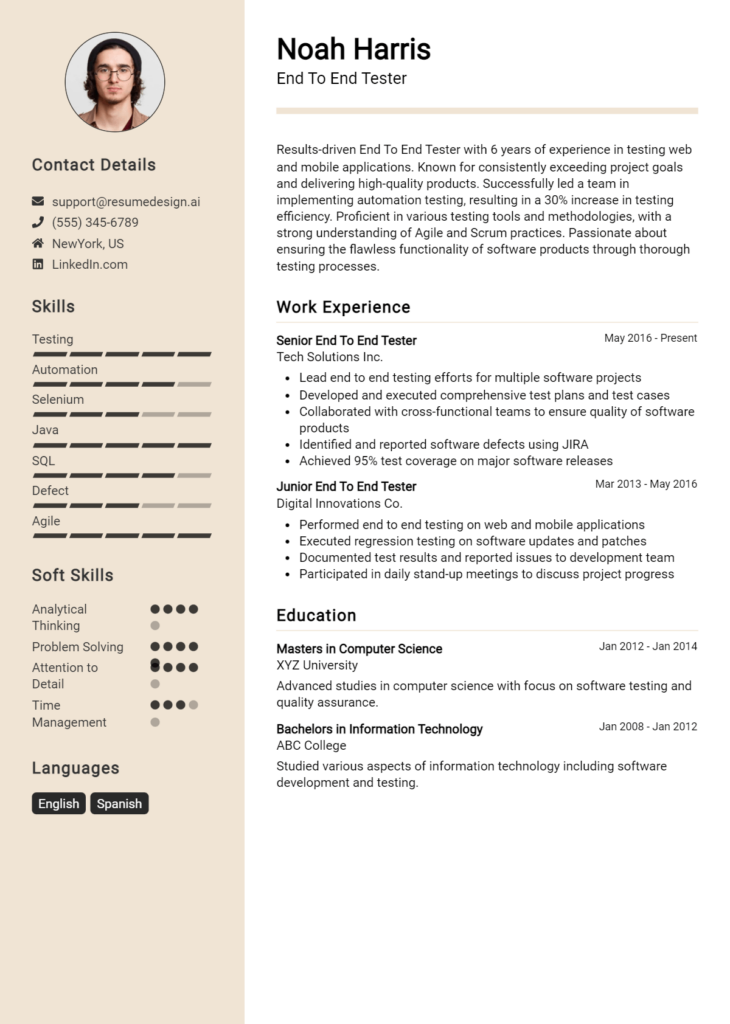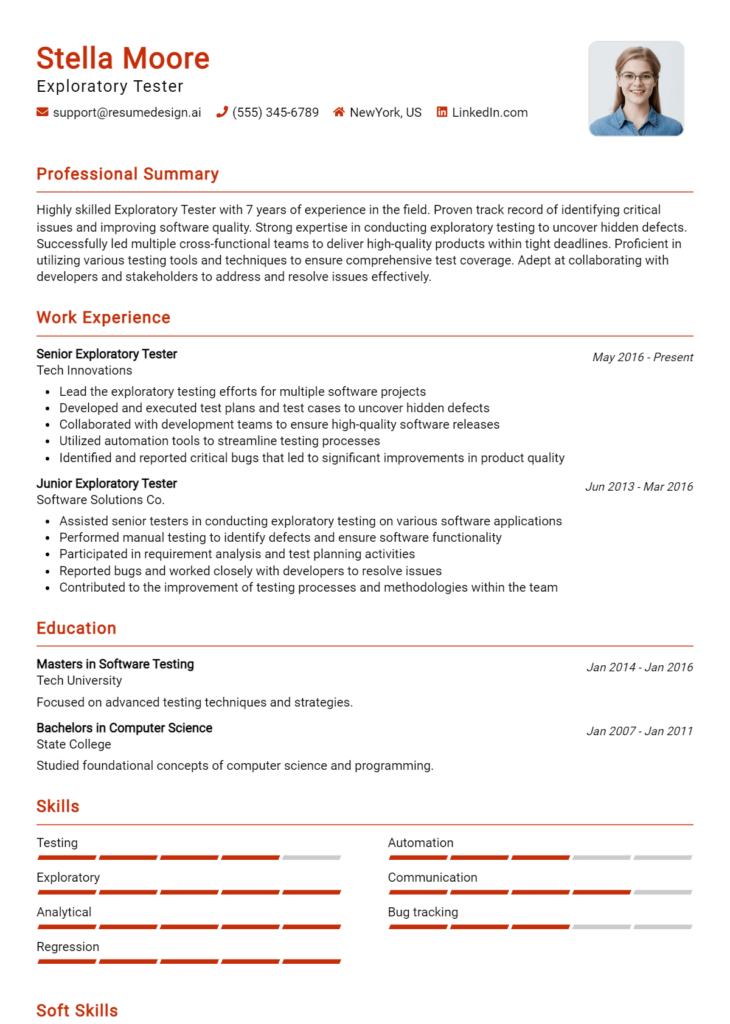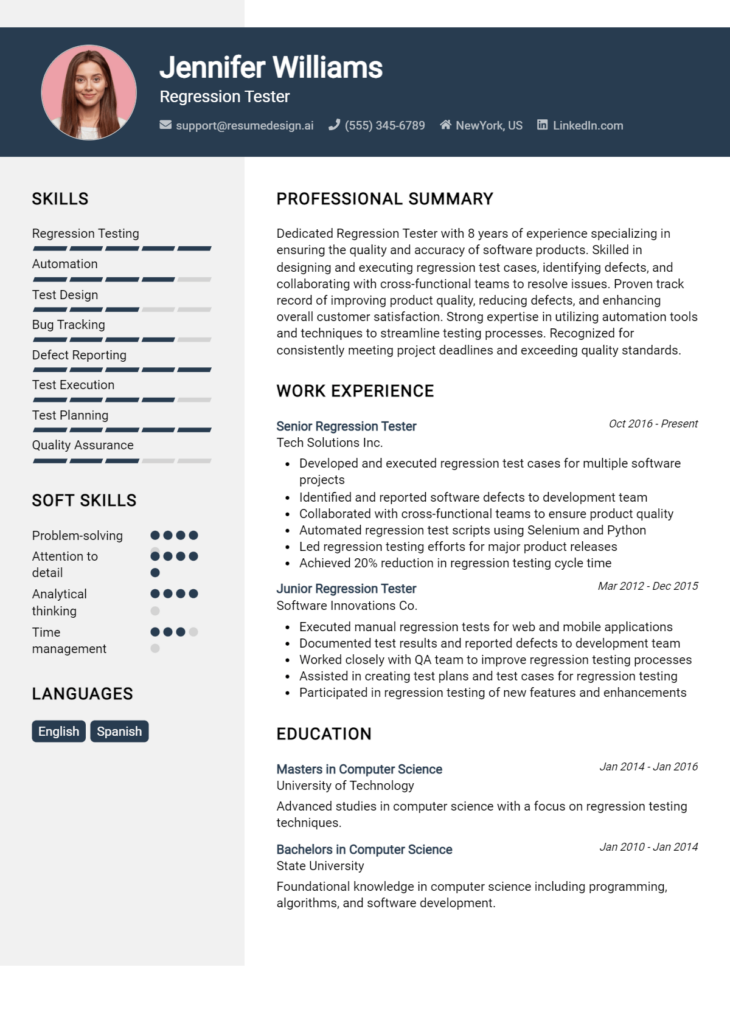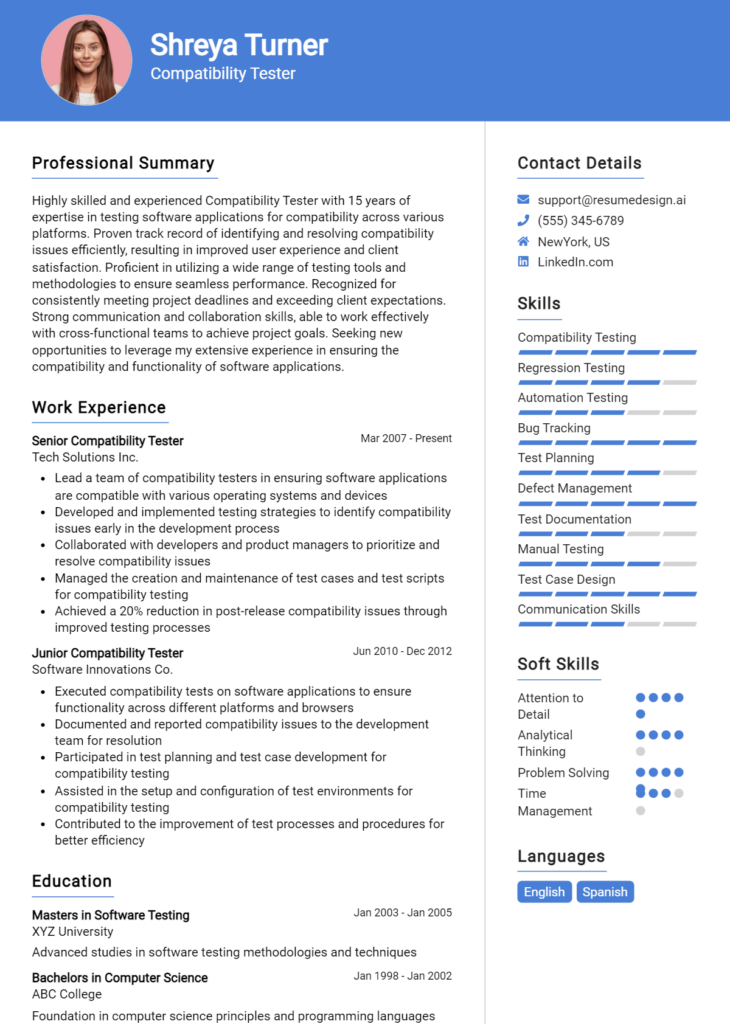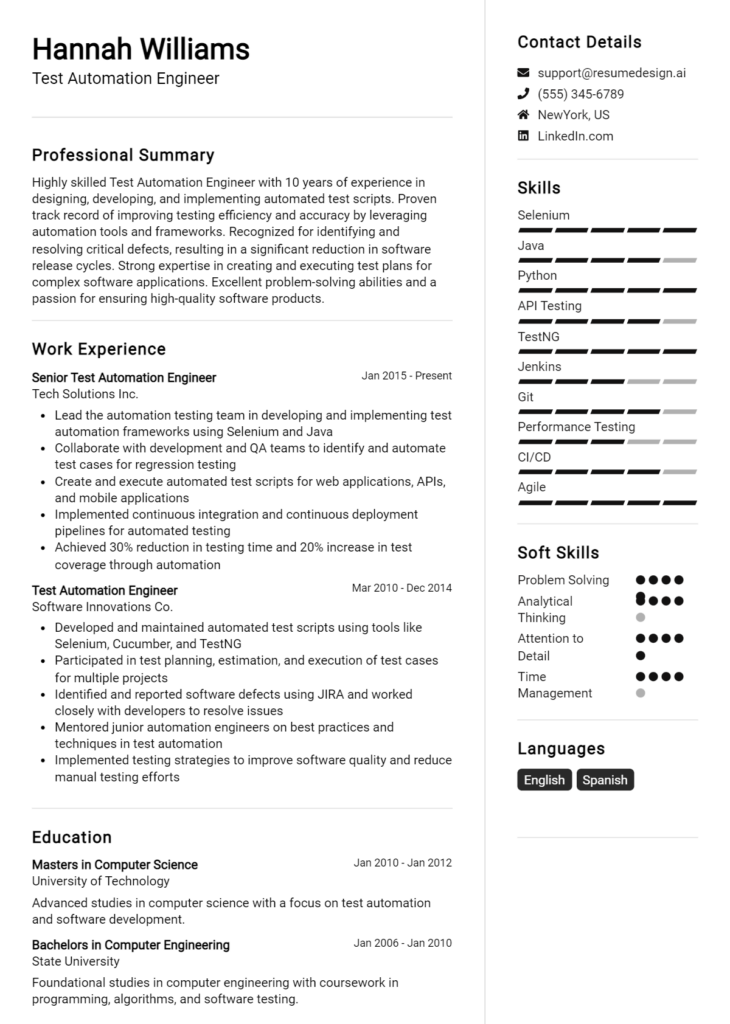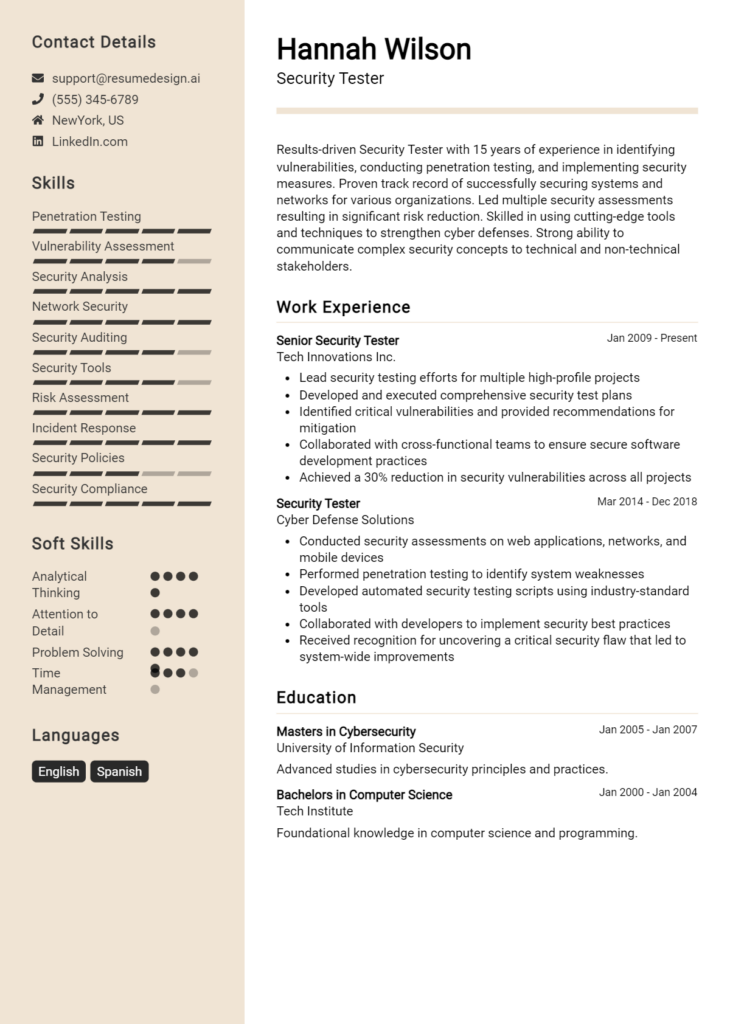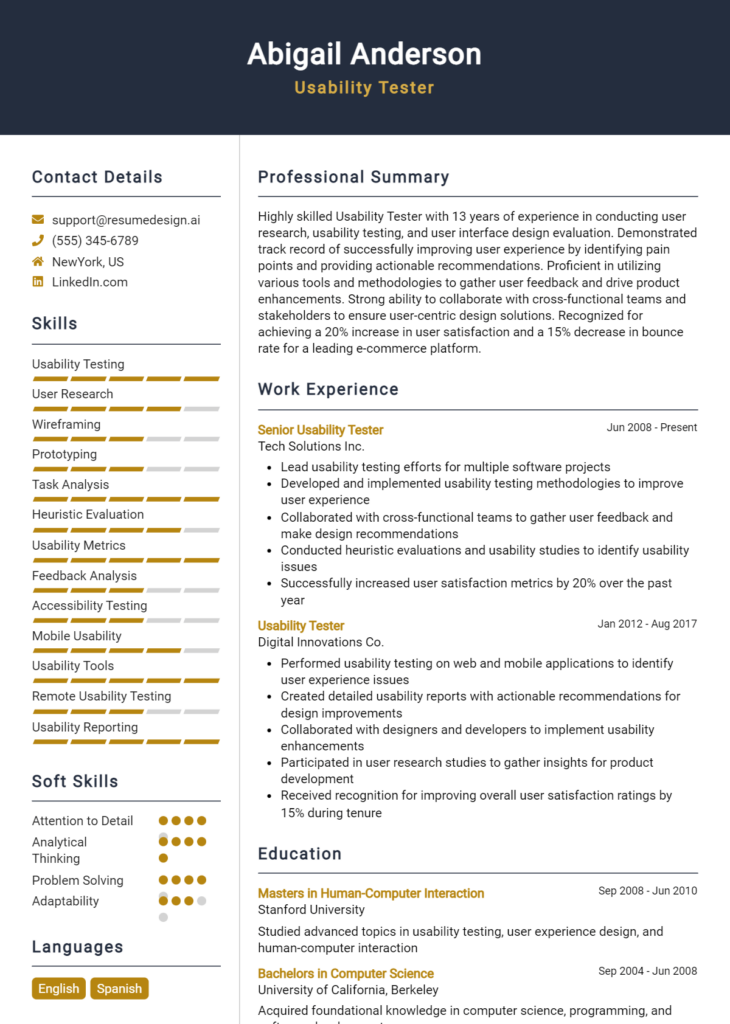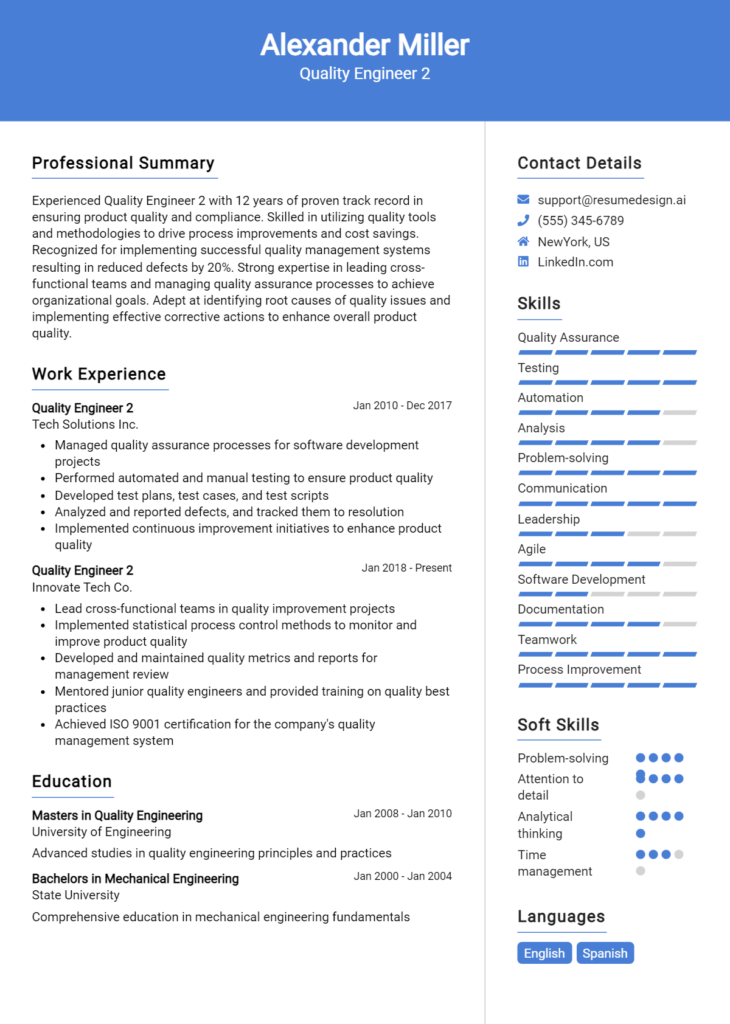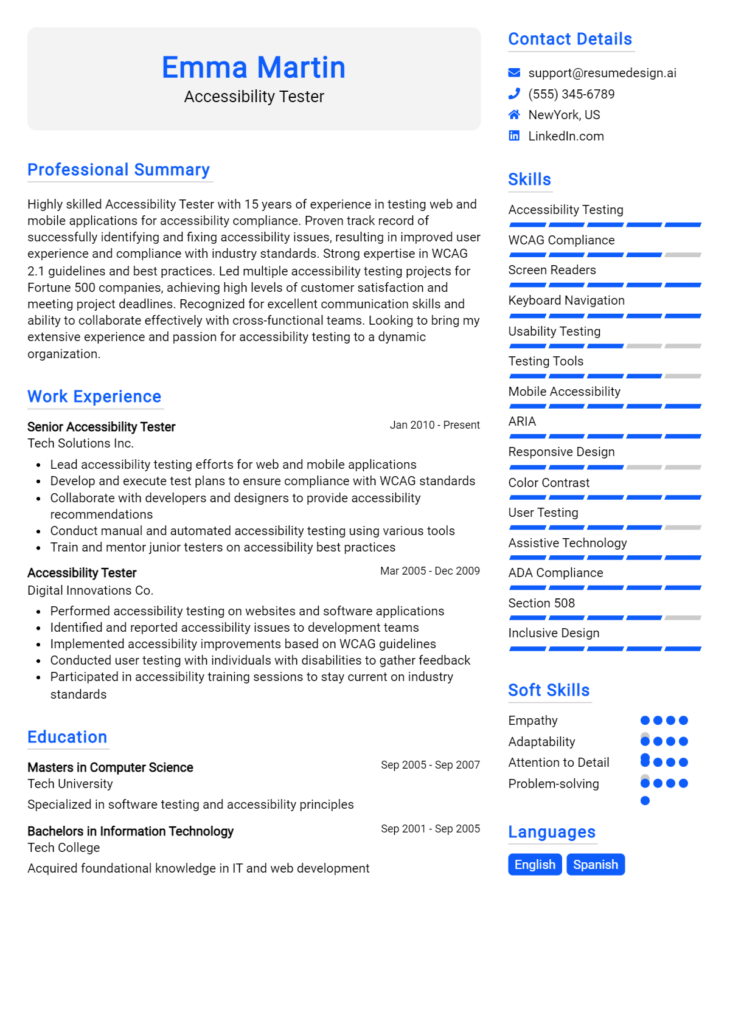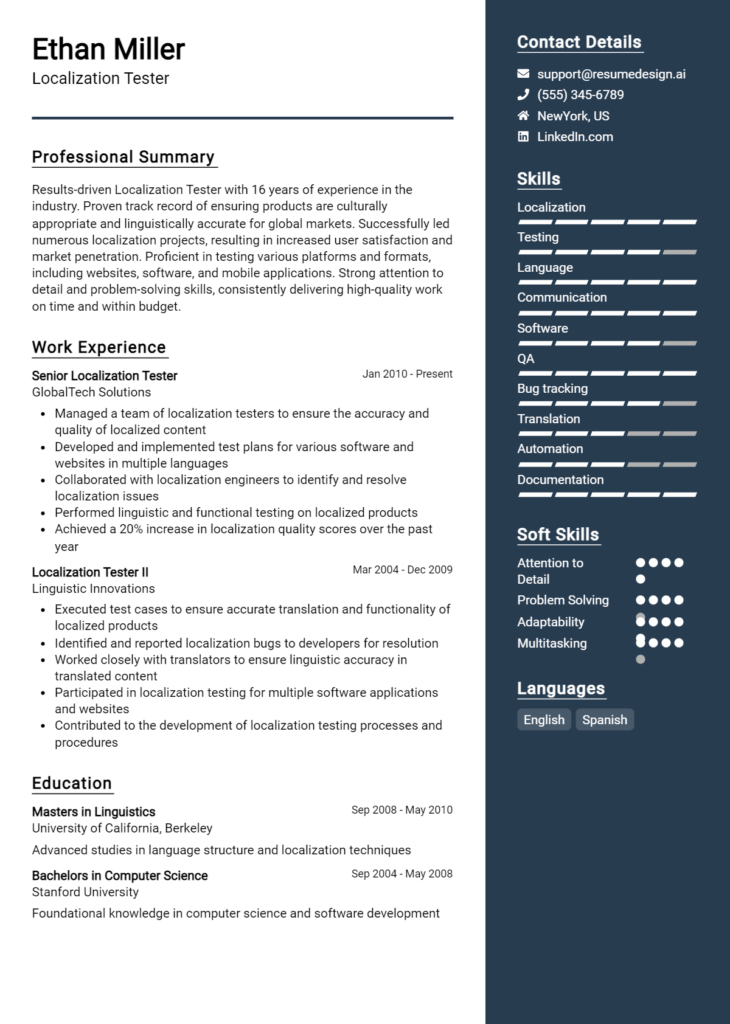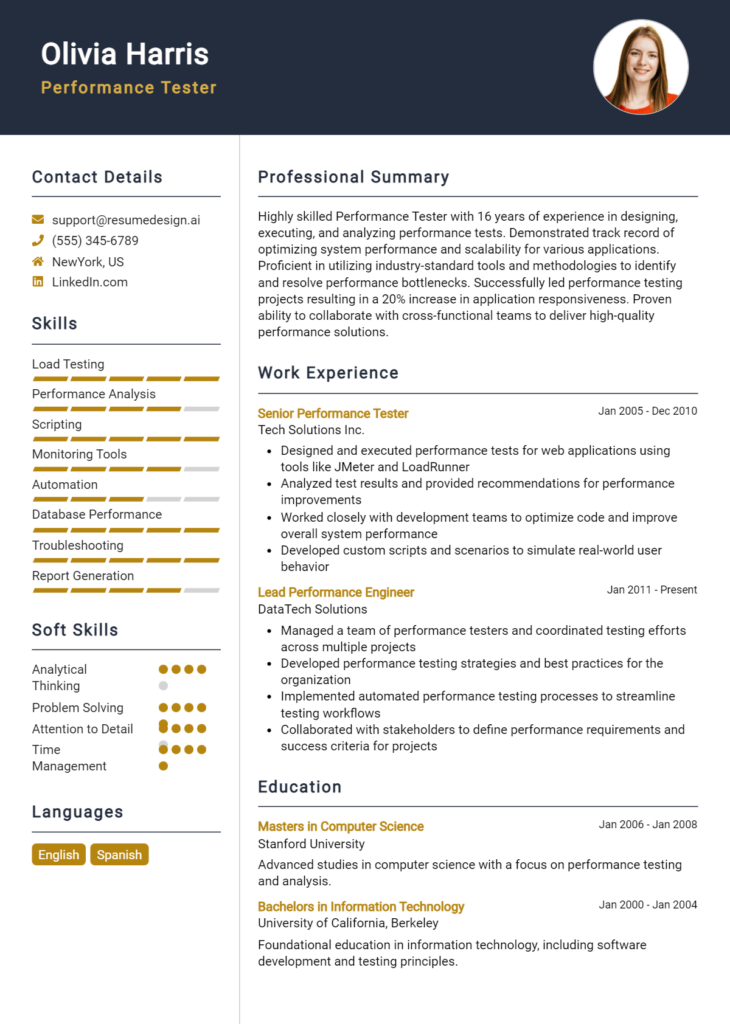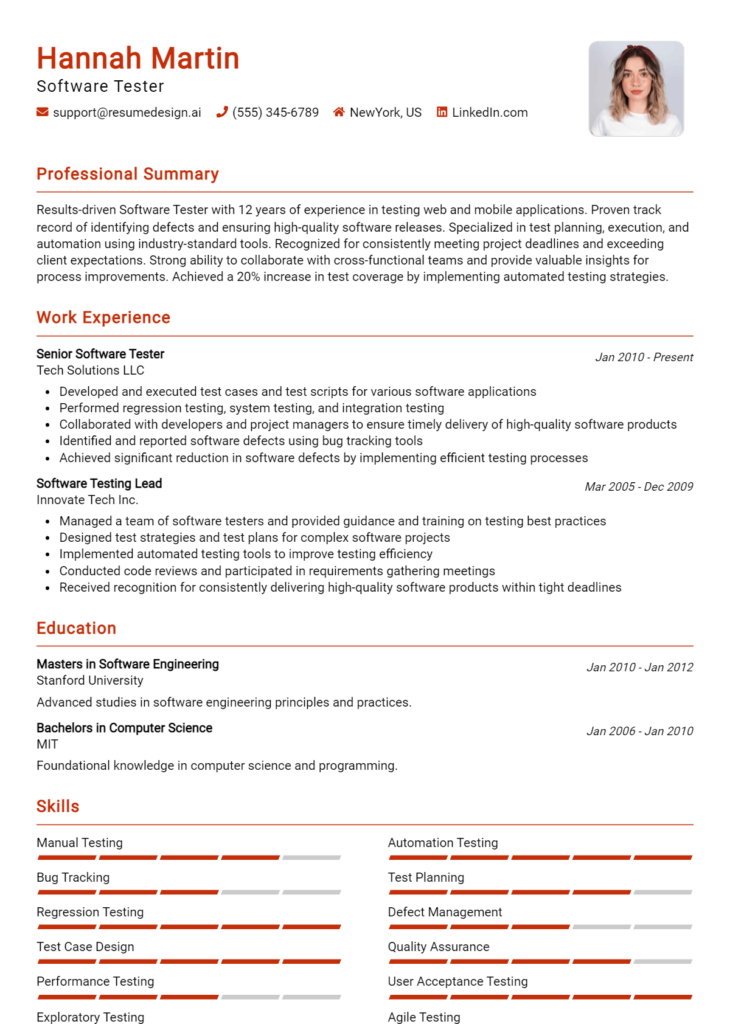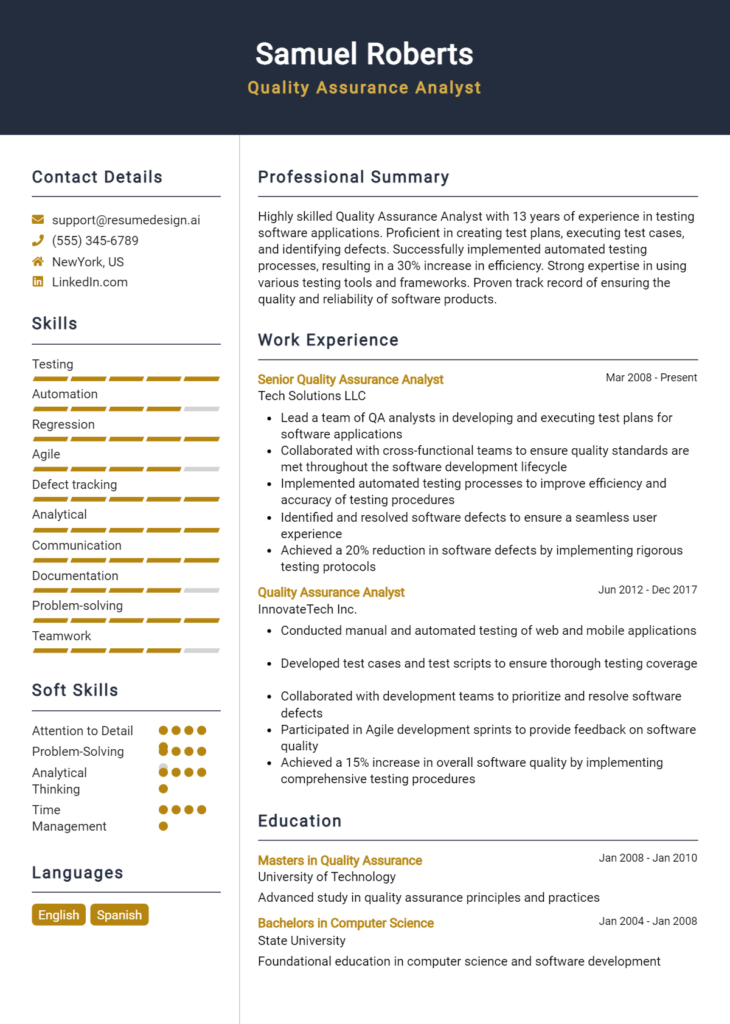Integration Tester Core Responsibilities
An Integration Tester plays a crucial role in ensuring seamless communication and functionality between various systems and applications within an organization. This professional collaborates across departments, requiring strong technical skills in software testing, operational understanding of system integrations, and robust problem-solving abilities. Mastery in these areas not only enhances system performance but also aligns with the organization's overarching objectives. A well-structured resume highlighting these qualifications is essential to showcase a candidate's potential impact.
Common Responsibilities Listed on Integration Tester Resume
- Develop and execute integration test plans and test cases.
- Collaborate with cross-functional teams to understand integration requirements.
- Identify and document defects and variances in system integrations.
- Perform root cause analysis for integration issues and provide solutions.
- Automate integration testing processes where applicable.
- Ensure compliance with integration standards and best practices.
- Review and validate system interfaces and data flows.
- Participate in code reviews and provide feedback on integration aspects.
- Track and report on testing progress and results to stakeholders.
- Continuously improve testing methodologies and tools.
- Assist in training team members on integration testing tools and techniques.
- Stay updated with industry trends and advancements in integration testing.
High-Level Resume Tips for Integration Tester Professionals
In the competitive field of integration testing, a well-crafted resume is your first opportunity to make a lasting impression on potential employers. It serves as your personal marketing tool, showcasing your skills, experience, and achievements in a way that aligns with the needs of the job. A strong resume not only highlights your technical expertise but also communicates your ability to contribute effectively to an organization’s goals. This guide will provide practical and actionable resume tips specifically tailored for Integration Tester professionals, ensuring that your application stands out in a crowded job market.
Top Resume Tips for Integration Tester Professionals
- Tailor your resume to match the job description by incorporating relevant keywords.
- Showcase your experience with integration testing tools such as Selenium, JUnit, or Postman.
- Quantify your achievements by including metrics, such as the percentage of bugs detected or the speed of integration processes improved.
- Highlight industry-specific skills, such as API testing, data integration, and automated testing frameworks.
- Include certifications like ISTQB or relevant training that enhances your credibility as an integration tester.
- Describe your role in team projects, emphasizing collaboration and communication skills.
- Utilize a clean and professional layout to improve readability and engagement.
- Incorporate a summary statement at the beginning to capture your career highlights and aspirations.
- Focus on continuous learning by mentioning any recent courses or workshops related to integration testing.
- Use action verbs to convey your contributions and impact in previous roles effectively.
By implementing these tips, you can significantly enhance your resume's effectiveness and increase your chances of landing a job in the Integration Tester field. A polished and tailored resume not only showcases your qualifications but also demonstrates your proactive approach and commitment to your professional development, making you a compelling candidate for potential employers.
Why Resume Headlines & Titles are Important for Integration Tester
In the competitive field of integration testing, a well-crafted resume headline or title can serve as a powerful tool to capture the attention of hiring managers. This key element of a resume not only summarizes a candidate's key qualifications but also sets the tone for the rest of the application. A strong headline should be concise, relevant, and directly related to the job being applied for, allowing prospective employers to quickly gauge the candidate’s fit for the position. By effectively articulating critical skills and experiences in just a few words, a compelling resume headline can make a lasting impression and encourage hiring managers to delve deeper into the resume.
Best Practices for Crafting Resume Headlines for Integration Tester
- Keep it concise: Aim for no more than 10-12 words.
- Be role-specific: Tailor the headline to reflect the specific integration tester position.
- Use impactful language: Choose strong action verbs and industry-relevant keywords.
- Highlight key skills: Include core competencies that are essential for the role.
- Incorporate measurable achievements: Reference quantifiable successes when possible.
- Showcase relevant experience: Mention specific tools, technologies, or methodologies.
- Make it unique: Avoid generic phrases that could apply to any candidate.
- Align with job description: Use terminology that mirrors the specific job listing.
Example Resume Headlines for Integration Tester
Strong Resume Headlines
Detail-oriented Integration Tester with 5+ years of experience in automated testing.
Results-driven QA Specialist proficient in API integration and test automation frameworks.
Integration Testing Expert with a proven track record of enhancing software quality.
Certified Integration Tester skilled in Agile methodologies and cross-functional collaboration.
Weak Resume Headlines
Looking for a job in testing.
QA professional with various skills.
Tester seeking opportunities.
The strong headlines are effective because they clearly communicate the candidate’s key strengths, relevant experience, and the specific value they bring to the role of an integration tester. They utilize industry-specific terminology and metrics to create a robust image of the candidate's qualifications. Conversely, the weak headlines lack specificity and fail to convey any meaningful information about the candidate’s skills or achievements, making them less likely to capture the interest of hiring managers. By avoiding generic phrases and focusing on impactful language, candidates can significantly enhance their chances of standing out in the application process.
Writing an Exceptional Integration Tester Resume Summary
A well-crafted resume summary is essential for an Integration Tester as it serves as the first impression a candidate makes on hiring managers. This brief yet impactful section encapsulates key skills, relevant experience, and notable accomplishments that align with the job role. A strong summary quickly captures attention, making it easier for hiring managers to see the value a candidate can bring to their organization. It should be concise, impactful, and tailored specifically to the job being applied for, ensuring that the candidate's qualifications stand out in a competitive job market.
Best Practices for Writing a Integration Tester Resume Summary
- Quantify achievements: Use specific numbers to demonstrate your impact, such as successfully integrating systems that improved efficiency by X%.
- Focus on relevant skills: Highlight key skills that are essential for an Integration Tester, such as knowledge of integration methodologies and testing tools.
- Tailor to the job description: Customize your summary to reflect the requirements and responsibilities listed in the job posting.
- Keep it concise: Aim for 2-4 sentences that convey your most important qualifications without unnecessary fluff.
- Use action verbs: Start your sentences with strong action verbs to convey confidence and proactivity.
- Highlight certifications: If applicable, mention any relevant certifications that enhance your qualifications as an Integration Tester.
- Showcase problem-solving skills: Emphasize your ability to troubleshoot and resolve integration issues effectively.
- Include industry experience: Mention your experience in specific industries, if relevant, to demonstrate your understanding of sector-specific challenges.
Example Integration Tester Resume Summaries
Strong Resume Summaries
Results-driven Integration Tester with over 5 years of experience in automating integration tests, achieving a 30% reduction in testing time. Proficient in using tools such as Selenium and JMeter, and skilled in RESTful API testing. Successfully collaborated with cross-functional teams to deliver high-quality software solutions on schedule.
Detail-oriented Integration Tester with a proven track record of identifying and resolving integration issues in complex systems. Led a project that improved data flow between applications, resulting in a 25% increase in operational efficiency. Experienced in Agile methodologies and continuous integration environments.
Certified Integration Tester with expertise in both manual and automated testing. Played a key role in integrating multiple systems for a major client, which decreased system downtime by 40%. Excellent communication skills, enabling effective collaboration with developers and project managers.
Weak Resume Summaries
Integration Tester with some experience in testing. Looking for a new opportunity to grow my skills.
Experienced in software testing and integration. I am a hard worker and a team player.
The strong resume summaries are considered effective because they provide specific, quantifiable achievements that showcase the candidate's value. They highlight relevant skills and experiences directly tied to the Integration Tester role, making it clear to hiring managers why the candidate would be a good fit. In contrast, the weak summaries are vague and lack measurable outcomes, making it difficult for potential employers to assess the candidate's qualifications or contributions.
Work Experience Section for Integration Tester Resume
The work experience section of an Integration Tester resume is crucial as it serves as a comprehensive showcase of the candidate's technical skills, ability to manage teams, and their effectiveness in delivering high-quality products. This section not only highlights specific testing methodologies and tools that the candidate is proficient in but also emphasizes their role in collaborative projects and the measurable impact of their contributions. Quantifying achievements, such as improved defect rates or enhanced testing efficiency, and aligning work experience with industry standards are essential to presenting oneself as a strong contender in the competitive field of integration testing.
Best Practices for Integration Tester Work Experience
- Highlight relevant testing tools and technologies utilized in previous roles.
- Quantify achievements with metrics, such as defect reduction percentages or testing cycle times.
- Detail collaboration with cross-functional teams to demonstrate teamwork and communication skills.
- Use action verbs to convey a sense of proactivity and leadership in project outcomes.
- Align experiences with industry standards and best practices for integration testing.
- Incorporate specific examples of integration challenges faced and solutions implemented.
- Showcase continuous learning or certifications relevant to integration testing.
- Tailor the experience section to match the job description and desired qualifications of the position applied for.
Example Work Experiences for Integration Tester
Strong Experiences
- Led a cross-functional team to implement an automated testing framework, reducing testing time by 40% and increasing defect detection rate by 30%.
- Developed and executed integration test plans for a complex software suite, resulting in a 25% decrease in post-release defects over three product cycles.
- Collaborated with development teams to streamline integration processes, which improved deployment speed by 15% and enhanced overall product quality.
- Implemented a continuous integration system that reduced integration issues by 50%, significantly improving team productivity and project timelines.
Weak Experiences
- Worked on integration testing for various projects without specifying tools or methodologies used.
- Participated in team meetings and contributed to discussions regarding testing.
- Assisted in the testing process as needed, sometimes helping with documentation.
- Performed integration tests and reported issues to the team.
The examples provided are considered strong because they clearly outline specific achievements and contributions, emphasizing quantifiable results and technical leadership. These statements highlight direct impacts on project outcomes, showcasing the candidate's value to potential employers. Conversely, the weak experiences lack specificity and fail to convey concrete achievements or the candidate's role in driving project success, which diminishes their effectiveness in demonstrating qualifications for the integration tester position.
Education and Certifications Section for Integration Tester Resume
The Education and Certifications section of an Integration Tester resume is vital as it showcases the candidate's academic qualifications, relevant certifications, and commitment to continuous learning in the field of integration testing. This section not only demonstrates the foundational knowledge acquired through formal education but also highlights any specialized training or industry-recognized credentials that further enhance the candidate's expertise. By providing details on relevant coursework and certifications, candidates can significantly boost their credibility and better align themselves with the requirements of the job role, making a compelling case for their ability to contribute effectively to the organization.
Best Practices for Integration Tester Education and Certifications
- Focus on relevant degrees, such as Computer Science, Information Technology, or Software Engineering, that directly relate to integration testing.
- List industry-recognized certifications, such as ISTQB, Certified Agile Tester (CAT), or specific integration testing tools.
- Include relevant coursework that showcases expertise in areas like software development, testing methodologies, and integration techniques.
- Highlight advanced certifications or specialized training that demonstrate a commitment to staying current with industry trends.
- Ensure clarity and conciseness by using bullet points for easy readability and emphasizing key achievements.
- Update the section regularly to include new certifications or courses completed, reflecting a proactive approach to professional development.
- Consider including any professional memberships or affiliations with testing organizations to further enhance credibility.
- Tailor the education and certifications section to align with the specific requirements of the job description being applied for.
Example Education and Certifications for Integration Tester
Strong Examples
- Bachelor of Science in Computer Science, XYZ University, 2020
- ISTQB Certified Tester Foundation Level, 2021
- Certified Agile Tester (CAT), 2022
- Coursework in Software Testing and Quality Assurance, XYZ University
Weak Examples
- Associate Degree in Arts, ABC Community College, 2018
- Certification in Microsoft Office, 2015
- High School Diploma, 2016
- Old certification in Manual Testing, obtained in 2010
The strong examples provided demonstrate a clear alignment with the requirements for an Integration Tester role, highlighting relevant degrees and certifications that showcase the candidate's expertise in software testing and integration practices. In contrast, the weak examples reflect qualifications that are either outdated or unrelated to the specific skills needed for integration testing, thereby failing to strengthen the candidate's position in the competitive job market.
Top Skills & Keywords for Integration Tester Resume
In the competitive field of software testing, the role of an Integration Tester is crucial in ensuring that various software components work seamlessly together. A well-crafted resume for an Integration Tester should prominently feature both hard and soft skills that highlight the candidate's technical expertise and interpersonal abilities. Skills not only demonstrate a candidate's qualifications but also their capability to effectively communicate and collaborate within a development team. By showcasing these skills, candidates position themselves as valuable assets in delivering high-quality software products.
Top Hard & Soft Skills for Integration Tester
Hard Skills
- Proficient in integration testing tools (e.g., SoapUI, Postman)
- Knowledge of programming languages (e.g., Java, Python, SQL)
- Experience with API testing and validation
- Familiarity with CI/CD pipelines (e.g., Jenkins, Git)
- Understanding of software development methodologies (e.g., Agile, Waterfall)
- Ability to write and execute test cases and scripts
- Knowledge of database management and query optimization
- Experience with defect tracking tools (e.g., JIRA, Bugzilla)
- Familiarity with cloud services (e.g., AWS, Azure)
- Understanding of data integration and ETL processes
- Knowledge of performance testing concepts
- Ability to analyze system architecture and design
- Experience with automation testing frameworks (e.g., Selenium)
- Proficiency in version control systems (e.g., Git)
Soft Skills
- Strong analytical and problem-solving abilities
- Excellent communication and interpersonal skills
- Attention to detail and a strong focus on quality
- Ability to work collaboratively in a team environment
- Adaptability to changing project requirements
- Effective time management and prioritization skills
- Strong critical thinking and decision-making capabilities
- Ability to mentor and guide junior testers
- Empathy and understanding of user experience
- Strong organizational and documentation skills
- Resilience and perseverance in troubleshooting issues
- Open-mindedness and willingness to learn new technologies
- Ability to handle stress and meet tight deadlines
- Strong negotiation and conflict resolution skills
By integrating these skills into your resume, along with relevant work experience, you will enhance your chances of standing out as a qualified candidate for Integration Tester positions.
Stand Out with a Winning Integration Tester Cover Letter
I am writing to express my interest in the Integration Tester position at [Company Name], as advertised on [Job Board/Company Website]. With a solid background in software testing and a keen eye for detail, I am confident in my ability to contribute to the quality and success of your integration processes. My experience in validating and verifying complex system interactions aligns well with the requirements of this role, and I am excited about the opportunity to work with your talented team.
In my previous role at [Previous Company Name], I successfully executed integration testing for multiple software projects, ensuring seamless communication between various subsystems. I developed comprehensive test plans and automated test scripts that significantly reduced testing time and improved accuracy. My ability to identify defects early in the development cycle not only enhanced the overall product quality but also facilitated smoother deployments. I thrive in collaborative environments, working closely with developers, product managers, and other stakeholders to ensure that all integration points are thoroughly tested and documented.
I am particularly drawn to [Company Name] because of your commitment to innovation and excellence in software development. I believe my proactive approach and problem-solving mindset will be a valuable addition to your team. I am eager to bring my expertise in integration testing, along with my passion for delivering high-quality software, to help [Company Name] achieve its goals. Thank you for considering my application. I look forward to the opportunity to discuss how my skills and experiences align with your needs.
Common Mistakes to Avoid in a Integration Tester Resume
When crafting a resume for an Integration Tester position, it's crucial to present your skills and experiences clearly and effectively. Many candidates often fall into common pitfalls that can undermine their chances of landing an interview. Avoiding these mistakes can significantly improve the quality of your resume and make you stand out in a competitive job market. Here are some common mistakes to avoid:
Vague Job Descriptions: Failing to provide specific details about previous roles can leave employers uncertain about your actual experience and contributions. Use clear, concise language to describe your responsibilities and achievements.
Neglecting Relevant Skills: Not emphasizing key skills such as API testing, automation tools, or scripting languages can be detrimental. Tailor your resume to highlight the skills that are most relevant to the position you're applying for.
Ignoring Keywords: Many companies use applicant tracking systems (ATS) to filter resumes. Not incorporating relevant keywords from the job description can lead to your resume being overlooked. Analyze the job posting and include pertinent terms.
Overloading with Technical Jargon: While it’s important to showcase your technical expertise, using too much jargon can alienate hiring managers who may not be familiar with specific terms. Strike a balance by explaining your skills in an accessible manner.
Not Quantifying Achievements: Failing to quantify your accomplishments can diminish the impact of your contributions. Use metrics and data to illustrate your successes, such as "reduced testing time by 30% through automation."
Poor Formatting: A cluttered or confusing layout can make your resume hard to read. Use clear headings, bullet points, and consistent formatting to ensure that your resume is organized and visually appealing.
Omitting Soft Skills: Integration testing often requires strong communication and teamwork abilities. Not mentioning these soft skills can make your application seem one-dimensional. Include examples that demonstrate your collaboration and problem-solving skills.
Listing Irrelevant Experience: Including unrelated job experiences can dilute the effectiveness of your resume. Focus on roles and responsibilities that directly relate to integration testing and showcase your relevant skills.
Conclusion
As we conclude this exploration of the Integration Tester role, it's essential to highlight the critical skills and competencies required in this field. Integration Testers play a vital role in ensuring that software components work seamlessly together, which is crucial for delivering a high-quality user experience. Key responsibilities often include developing test plans, executing test cases, identifying defects, and collaborating closely with development teams to resolve issues.
Having a well-crafted resume is paramount for standing out in this competitive job market. Ensure that your resume effectively showcases your technical expertise, problem-solving abilities, and familiarity with testing tools and methodologies relevant to integration testing.
We encourage you to take the time to review and refine your Integration Tester resume. To assist you in this process, a variety of resources are available, including resume templates to give you a professional layout, a resume builder for easy customization, resume examples to inspire your content, and cover letter templates to accompany your application. By leveraging these tools, you can create a compelling resume that highlights your qualifications and sets you apart from the competition. Start enhancing your job application today!

